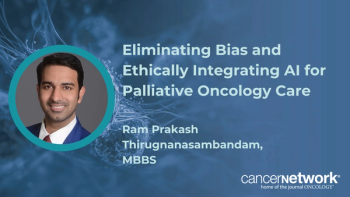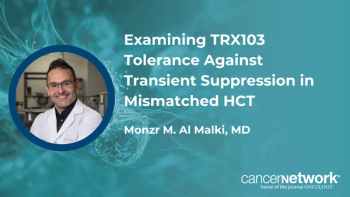
Oncology NEWS International
- Oncology NEWS International Vol 19 No 8
- Volume 19
- Issue 8
Second-Generation TKIs Poised to Succeed Imatinib in Newly Diagnosed CML
Imatinib (Gleevec), the first-line standard of care in chronic myeloid leukemia, will become a generic drug in 2015, so the race is on to find a second generation of tyrosine kinase inhibitors (TKIs) that can do the job just as well.
© Prof. Jean Bonhomme Photomicrograph of chronic myeloid leukemia, also known as myelogenous leukemia, from a blood smear, mag. 350 (at 24 × 36 mm).
Imatinib (Gleevec), the first-line standard of care in chronic myeloid leukemia, will become a generic drug in 2015, so the race is on to find a second generation of tyrosine kinase inhibitors (TKIs) that can do the job just as well.
Dasatinib (Sprycel) and nilotinib (Tasigna) have demonstrated benefits as second-line therapies, but could they be frontrunners as first-line therapy as well? New studies would seem to support that theory, although longer patient follow-up and, of course, cost considerations will ultimately determine whether dasatinib and nilotinib are up to the task.
FACT FDA fast tracks dasatinib The FDA has granted priority review to dasatinib for the treatment of adults with newly diagnosed chronic CML. The projected FDA action date is October 28, 2010, according to Bristol-Meyers Squibb.
"Imatinib has changed the treatment of CML," said Hagop Kantarjian, MD, a professor and chair of the leukemia department at the M.D. Anderson Cancer Center in Houston. "However, there are about 2% to 4% of patients every year who develop resistance or toxicities that require different therapies, and this is where the new generation of TKIs [could] have a significant role: in managing imatinib failure."
Dr. Kantarjian led a study that evaluated the efficacy and safety of dasatinib compared with imatinib. A second study, the ENESTnd trial, compared nilotinib with imatinib (see "
For the dasatinib study, 519 patients with newly diagnosed CML were randomized to dasatinib (100 mg) or imatinib (400 mg) for one year.
Complete cytogenetic response (CCyR) and major molecular response (MMR) were used to evaluate efficacy. The primary endpoint was confirmed CCyR, defined as CCyR on two consecutive analyses (ASCO 2010 abstract LBA6500; N Engl J Med 362:2260-2270, 2010).
FACT Bosutinib on the brink Additional data on the potential role of second-generation TKIs will come from a study that is comparing bosutinib (SK-606) to imatinib as a fi rst-line treatment for CML (
ASCO 2010
abstract 6502). That data should be mature in October 2010, said Dr. Kantarjian, who is participating in the trial.
According to the results, the confirmed CCyR with dasatinib was greater than with imatinib (77% vs 66%; P = .0067) at 12 months. In addition, dasatinib was superior to imatinib in both CCyR (83% vs 72%; P = .0011) and MMR (46% vs 28%; P < .0001) at 12 months. Patients treated with dasatinib also achieved significantly faster MMR (hazard ratio of 2.0; P < .0001) and CCyR (HR 1.4; P < .0001) than those treated with imatinib and had a low rate of progression (1.9% vs 3.5%).
Dasatinib was well tolerated, with similar side effects in both groups including grade 3/4 anemia (10% vs 7% for imatinib), neutropenia (21% vs 20%), and thrombocytopenia (19% vs 10%). Nonhematologic adverse drug reactions included fluid retention (19% vs 42%) and nausea (8% vs 20%).
Dr. Kantarjian ventured that these trial results already suggest that dasatinib should become first-line therapy for newly diagnosed CML, although cost is an issue, he acknowledged.
"I think, in time, the new TKIs could replace imatinib in frontline," he told Oncology News International. "The scenario will also be influenced in 2015. . . by the differential cost of new TKIs and generic imatinib [which] could be huge: Less than $5,000 to $10,000 for generic imatinib vs $60,000 to $80,000." Another consideration will have to be the differential benefits (progression-free survival, overall survival) with imatinib vs new TKIs, he added.
VANTAGE POINT
SONALI SMITH, MD New data don't quite herald demise of imatinib
More mature data and cost issues will ultimately drive the use of second-generation TKIs in CML, said Dr. Smith, an assistant professor in the hematology/oncology section and the associate director of the lymphoma program at the University of Chicago.
"Most physicians will wait for more mature data," she said. "Another issue is that although dasatinib leads to faster, deeper [responses] and an increased number of responses, imatinib is still pretty good."
There are also financial considerations, she added. "Imatinib will be coming off patent soon, and there will need to be decisions [made] on whether the extra cost associated with second-generation TKIs is warranted."
Articles in this issue
over 15 years ago
Who's Newsover 15 years ago
Sonography better to monitor small testicular lesionsover 15 years ago
FDA Panel Says No More Avastin in Breast Cancerover 15 years ago
Cell-signaling pathway may be new Rx target ER+ breast cancerover 15 years ago
Ohio cancer center breaks ground on $1 billion additionover 15 years ago
Imaging experts debate link between CT scans, cancer riskNewsletter
Stay up to date on recent advances in the multidisciplinary approach to cancer.
Related Content




Examining TRX103 Tolerance Against Transient Suppression in Mismatched HCT









































